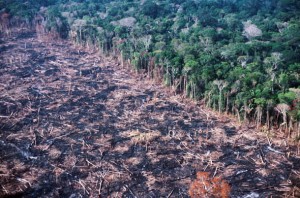 The Science magazine article that was published last week and co-authored by Tim Searchinger, a lawyer, has added another level of controversy to the indirect land use change (ILUC) debate. The article suggested the land use effects of fuel produced from various forms of biomass were miscalculated, in part, because they cause deforestation around the world as land is cleared to grow so called “energy crops”. EPA has yet to rule on RFS2 (they are unsure of how to incorporate ILUC) and discussion on how to regulate bio-electricity has barely begun.
The Science magazine article that was published last week and co-authored by Tim Searchinger, a lawyer, has added another level of controversy to the indirect land use change (ILUC) debate. The article suggested the land use effects of fuel produced from various forms of biomass were miscalculated, in part, because they cause deforestation around the world as land is cleared to grow so called “energy crops”. EPA has yet to rule on RFS2 (they are unsure of how to incorporate ILUC) and discussion on how to regulate bio-electricity has barely begun.
Novozymes is one of the dozens of companies speaking out against the article and its conclusions. Suggestions that the increased use of fuel produced from biomass will automatically lead to increased deforestation globally ignores existing science, continued technological advances, and numerous international policies and principles under development to regulate biofuels, say experts at Novozymes.
“We need to make smart energy choices that support a low-carbon energy future,” said Adam Monroe, president of Novozymes North America. “Jumping to quick conclusions about deforestation may ruin one of our best chances for addressing climate change and establishing a sustainable, secure energy supply.”
Because of the potential value that biofuels have as part of a low-carbon society, dozens of scientists have challenged the credibility of economic models used to estimate the values of GHG emissions projected from ILUC.
“Clearly, the direct and indirect environmental impacts of the world’s energy supply need further study, but there needs to be a level playing field to ensure that biofuels, bioelectricity and, most importantly, fossil fuels are all judged by the same criteria when measuring emissions. There should be a full accounting of the carbon emissions of all fuels, not just biofuels,” said Monroe.

